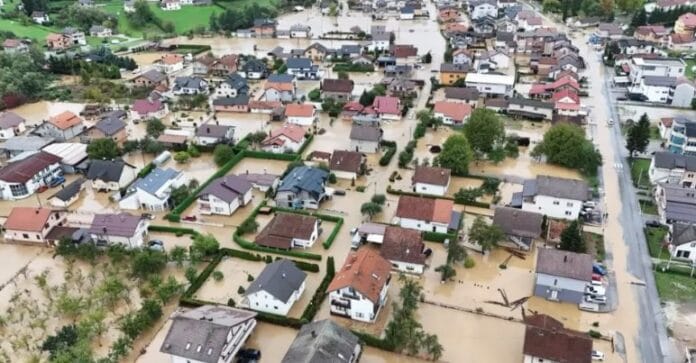Central Bosnia-Herzegovina has been struck by devastating flash floods and landslides, leaving at least 18 people dead, dozens missing, and entire towns submerged. The hardest-hit area, Jablanica, located between Mostar and Sarajevo, bore the brunt of the disaster. As rivers burst their banks and landslides buried homes, rescue teams from neighboring countries and the EU have been racing against time to save lives. This catastrophe serves as yet another warning of how climate change is amplifying extreme weather events across Europe, placing the continent’s infrastructure and communities at unprecedented risk.
The Flooding Crisis in Bosnia-Herzegovina
The torrential rains that triggered landslides and flash floods have left towns like Jablanica and nearby villages devastated. Homes were submerged almost to their rooftops, and vital infrastructure—such as roads, bridges, and railway tracks—was washed away or rendered unusable. The flooding occurred after an overnight storm, with the situation worsening as landslides from a nearby quarry buried homes under rocks and mud.
Emergency response teams from Serbia, Croatia, and North Macedonia, along with European Union support, are engaged in rescue efforts, but more than a dozen people remain unaccounted for. Rescue operations are challenged by the sheer volume of debris, washed-out roads, and the submerged condition of many areas. Drone footage reveals the extent of the devastation, with entire communities cut off and water levels still rising in certain regions.
Widening Impact Across Europe
The flooding is not limited to Bosnia-Herzegovina. Neighboring countries like Montenegro and Croatia have also been impacted, with villages cut off by washed-away roads and rising water levels threatening additional areas. In Montenegro, the village of Komarnica has been left isolated, while in Croatia, authorities in Karlovac are bracing for potential floods along the Kupa River.
These events come on the heels of significant flooding last month across Central Europe, particularly in Poland, the Czech Republic, and Romania. The frequency and severity of these floods are clear indications of the mounting climate crisis that Europe faces. According to the World Weather Attribution (WWA) group, a recent four-day period was the rainiest ever recorded in the region, underscoring the link between climate change and extreme weather patterns.
Europe’s Fast-Warming Climate: A Dangerous Trend
Europe is currently the fastest-warming continent. According to the Copernicus Climate Service, the last five years have been around 2.3°C warmer than the second half of the 19th century. The flash floods and landslides in Bosnia-Herzegovina are yet another manifestation of the continent’s growing climate-related vulnerabilities.
The warming climate increases the atmosphere’s capacity to hold moisture, leading to heavier and more intense rainfall. As a result, even short periods of rainfall can trigger devastating floods, as seen in Bosnia-Herzegovina. The rising frequency of such events not only puts communities at risk but also tests the resilience of infrastructure that was never designed to withstand such extremes.
Analysis: Europe’s Climate Preparedness at Stake
The flash floods in Bosnia-Herzegovina raise pressing questions about Europe’s preparedness to handle the consequences of climate change. As extreme weather becomes more common, countries must prioritise investment in resilient infrastructure and robust disaster response systems.
- Infrastructure Resilience: Bosnia’s roads, railways, and bridges were unable to withstand the intensity of the floods. The damage to the M-17 route and 17 km of railway highlights the need for Europe to re-evaluate its aging infrastructure in the face of climate change. Investment in flood defences, drainage systems, and disaster-proof building standards will be crucial in minimising damage from future events.
- Disaster Response Coordination: The rapid deployment of rescue teams from neighbouring countries is a positive sign of regional cooperation. However, as these disasters become more frequent, Europe must strengthen cross-border coordination, ensuring that rescue efforts and resources are mobilised swiftly.
- Climate Adaptation and Mitigation: Addressing the root cause of these disasters—climate change—will require a coordinated effort to reduce greenhouse gas emissions across Europe. Additionally, adaptation strategies, such as floodplain restoration, reforestation, and better land management, will be essential to mitigate the impact of future floods.
- Public Awareness and Preparedness: Governments must enhance public awareness regarding climate risks and improve early warning systems. Communities need to be educated about how to respond to natural disasters and equipped with the necessary tools and resources to survive and recover.
A Global Crisis with Local Consequences
The flash floods and landslides in Bosnia-Herzegovina are a tragic reminder that no country is immune to the growing threat of climate change. Europe, despite its advanced infrastructure and resources, faces mounting challenges as extreme weather events become more frequent and severe. The region must act swiftly to enhance its climate resilience, investing in stronger infrastructure, cross-border disaster response, and climate adaptation strategies. As Europe grapples with the consequences of climate change, the disaster in Bosnia-Herzegovina should serve as a wake-up call to the urgent need for action.




